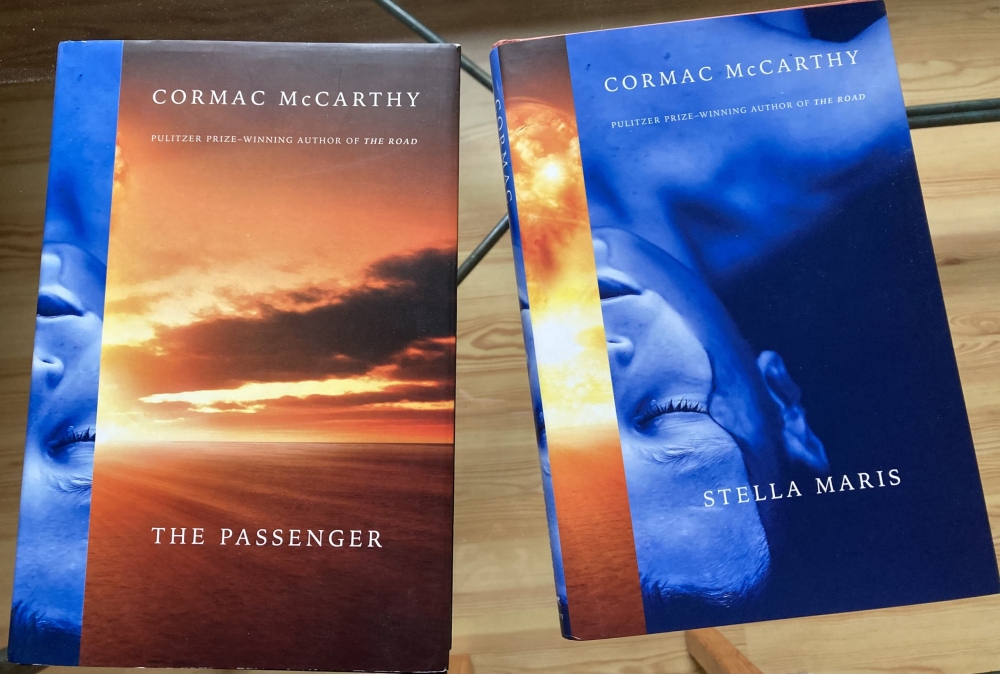I began to work on this review a few days after it was announced that author Cormac McCarthy died at the age of 89 at his home in Santa Fe, New Mexico. “From the start,” the Books Staff of The New York Times wrote, correctly I think, “his writing drew comparisons to novelists as different as William Faulkner and Mark Twain, but his themes were always and recognizably his own: justice, despair, the futile but urgent need for hope in a fallen world.” In a rare 1992 interview in The Times Magazine, “Mr. McCarthy named the ‘good writers’ as Melville, Dostoyevsky and Faulkner, a list that omitted writers who, as he put it, don’t ‘deal with issues of life and death.’” I am no prophet, but I suspect these grand themes—the perennial questions of humankind asked by every generation of every culture—along with McCarthy’s exquisitely gripping dialogue, compelling prose, and quirky punctuation means his books will be treasured for a very long time to come.
It’s striking to me that within a few days of each other, two men I have admired greatly—Timothy Keller and Cormac McCarthy—have walked through death into the other side. I did not know either one personally but felt I came to know them through their writings. I mourn them both and grieved as I wrote a tribute to Keller and this review of McCarthy’s last two novels. Our world is poorer as a result of their passing. Both men sought to see the world with the greatest possible clarity, and both came to the same conclusion: the world, all of reality, and all of us, are broken, so broken we cannot fix it on our own.
If you have not read McCarthy, I would suggest that you not start with The Passenger and Stella Maris. They are the last novels he wrote and seem to me to be the culmination of all his previous works. I don’t mean they contain the same characters or bring a continuous narrative to completion; they don’t. Rather, these two novels feel to me like a moment of “Application” at the end of a study. They explore the same basic theme(s) that have animated all McCarthy’s stories but put an ultimate challenge on the question of meaning and hope for our cynical, individualistic world of advanced modernity. In his earlier stories McCarthy demonstrates that as individuals, no matter what we experience or do or intend, by ourselves we cannot find an adequate reason to believe our lives and deaths as human beings, are finally meaningful. In The Passenger and Stella Maris McCarthy widens the scope of the search to include the best findings of modern science. His conclusion is that for all its vaunted promise of uncovering the secrets of existence, science will not and can not provide an ultimate sense of meaning for human beings caught in a world of mere matter and energy and time.
And so in his final two novels, we are left hanging. He challenges modern people to face the issue for ourselves: if even science, which has produced so many wonders, cannot provide a basis for real meaning, what can?
If you have not read McCarthy, here are a selection of his books that I’d recommend reading in the order he published them. Buy or borrow them, open at page one, and be prepared to be jolted to the core of your being. Here’s my list:
Blood Meridian (1985)
The Border Trilogy:
#1. All the Pretty Horses (1992)
#2. The Crossing (1994)
$3. Cities of the Plain (1998)
No Country for Old Men (2005)
The Sunset Limited (2006)
The Road (2006)
The Passenger (2022)
Stella Maris (2022)
Reviewers often described his perspective as “bleak” or “dark” or “venomous,” and if you have read his novels, you understand why. McCarthy insisted on taking into full account the grim reality of evil—personal, structural, and spiritual—that permeates every aspect of life and existence, and the horror of death that follows. His fiction reminds me of the work of Flannery O’Connor, who used the grotesque as a literary device in her stories much as McCarthy uses graphic, even horrific violence in his. O’Connor famously said that when you are writing for a tone-deaf society one needs to shout; writing half a century after O’Connor to an increasingly distracted culture, McCarthy apparently felt the need to shout even more loudly.
In “Cormac McCarthy’s Poetics of Being: Depicting life in the border country between cosmic order and immanent futility,” a review in The Hedgehog Review, philosopher Christopher Yates detects a question that underlies and animates McCarthy’s provocative stories.
Yes, there is the violence and bloodletting, the often idiosyncratic punctuation, the breathless or wooden sentences, the gothic and grotesque atmospherics. And certainly one might find fault with the dearth of female characters and the absence of resolving catharses. But if those become the settled points of reference by which we take the measure of McCarthy’s literary force, we risk losing sight of the desperately urgent search that animates each of his fugitive worlds. We lose sight of McCarthy’s persistent attempt to affirm something vital.
What was that search? As a chance old stranger says near the end of Cities of the Plain (1998), “This story like all stories has its beginnings in a question.” McCarthy’s question is the same that moved pre-Socratic thinkers such as Heraclitus, Parmenides, and Anaximander—thinkers for whom philosophy was a poetic task undertaken in the service of turning the soul toward something durable and true, if such a thing is to be found. Intimidating, inconvenient, and sometimes anguished, the question is this: Is there an ordering principle to reality (and of what kind?) or are we fated to an anchorless passage through futility and loss? Is our being driven by a fundamentally nihilistic materialism or cosmic grace, or maybe some undecided contest between the two? Martin Heidegger held that the question “What is the meaning of Being?” is the very question we live. For McCarthy, it is a question that we neglect at our peril—and one best attended to through story.
I’ve already mentioned the interview in which McCarthy says that “great” authors “deal with issues of life and death.”
“There’s no such thing as life without bloodshed,” McCarthy says philosophically. “I think the notion that the species can be improved in some way, that everyone could live in harmony, is a really dangerous idea. Those who are afflicted with this notion are the first ones to give up their souls, their freedom. Your desire that it be that way will enslave you and make your life vacuous.”
The plots of McCarthy’s stories are often very uncomfortable, and I think that like O’Connor, he meant them to be. Everything in our consumerist world is designed to keep us distracted and unreflective, alone and entertained. McCarthy seems to want us to see the full despair of having no credible reason to believe we have meaning and purpose in a broken world in which wickedness beyond imagination occurs, and then we die.
The stories told in The Passenger and Stella Maris—in one sense really one story—are full of opposites. They are set in both the world of ordinary folk and in the rarified world of advanced physics and mathematics. Bobby and Alicia Western’s father worked on the Manhattan Project, developing the atomic bomb. The shadow of the mushroom cloud hangs over their world, as it does ours. Bobby left physics when he realized he was not good enough to be great in the field and became an ocean salvage diver. Alicia left mathematics because she was in love with Bobby and diagnosed with paranoid schizophrenia. The Passenger is primarily Bobby’s story, an unsolved mystery as we watch his life unravel. Stella Maris consists of transcriptions of the therapy sessions between Alicia and her therapist in Stella Maris, the psychiatric hospital she chose to admit herself. Alicia’s story ends with suicide, a tragedy that opens The Passenger.
In a passage in The Passenger, Bobby Western is in conversation with a friend, John, to whom he makes a comment about the human condition:
You think that we loathe ourselves.
I do. Insufficient to our deserts, of course. But yes.
So how bad is the world?
How bad. The world’s truth constitutes a vision so terrifying as to beggar the prophecies of the bleakest seer who ever walked it. Once you accept that then the idea that all of this will one day be ground to powder and blown into the void becomes not a prophecy but a promise. So allow me in turn to ask you this question: When we and all our works are gone together with every memory of them and every machine in which such memory could be encoded and stored and the earth is not even a cinder, for whom then will this be a tragedy? Where would such a being be found? And by whom?
I don’t know, John.
The bore of one’s life closes down like a collet. A final pin of light and then nothing. [p. 378]
There is a perceptive review of these two final novels by Cormac McCarthy in Comment, “Passenger or Pilgrim” that I would urge you to read. The author, Christina Bieber Lake, is the Clyde S. Kilby Professor of English at Wheaton College and a Flannery O’Connor scholar. She picks up on the notion that the “world’s truth constitutes a vision so terrifying” as to be beyond all tragedy.
McCarthy’s prose is so seductive it is easy to find yourself persuaded that this “terrifying vision” is, in fact, the world’s truth. But isn’t it equally true that if God’s creative consciousness is behind it all, the idea that all this will one day be redeemed (and indeed re-created) also becomes not prophecy but promise? While we walk here, we walk in uncertainty of what lies on the other side, an uncertainty that physics will never resolve. But we do make some kind of choice. In The Road, the man chooses to “carry the fire”—to not give up on life and love in spite of journeying in a landscape utterly devoid of it. This is the hope of the pilgrim. It is not to hope against death but rather to hope in spite of it. Josef Pieper explains that “the ‘way’ of man leads to death as its end, but not as its meaning.”
On the one hand, McCarthy’s terrifying vision is nothing new—it has been a feature of the arts since the advent of modernism. Faulkner. Joyce. Woolf. And Hemingway: “All stories, if continued far enough, end in death, and he is no true-story teller who would keep that from you.” We can, perhaps, take it or leave it. But on the other hand, McCarthy presents us with something not so easily dismissed: a picture of the collective imagination of a Western world that is surely, steadily, and finally letting go of hope. When that happens, we will be left only with noisy, meaningless movement, the endless creation and re-creation of narratives, the fictions we choose to live by. Noise that is the hallmark of the perpetually distracted, the ones who close their eyes so as not to be reminded that we are passengers on a road—to nowhere.
I suspect—though I have no certainty of this—that McCarthy is content to raise a serious, deeply human question, reveal the profound mystery involved in even starting to search for some sort of answer, and then leaving the quest for us to pursue, or sadly, insanely, perhaps ignore. Accepting nihilism or some sort of ultimate meaninglessness will not sustain human flourishing or civilized society.
So, as I read The Passenger and Stella Maris, I resisted the urge to identify some character that might embody McCarthy’s personal position on the topic. I have, however, learned to look for some quiet brief meditation or aside, often just a short paragraph, that subtly hints at transcendence, that there is possibly something beyond us, beyond the merely visible in which meaning might be found. Such brief hints often appear in his novels. As I read these two final novels I found no such paragraph, and like some reviewers wondered if McCarthy had indeed given up hope.
And then it struck me that I might be missing something obvious. The Passenger opens with a mystery that remains unsolved through to the final page. Using a powerful metaphor of mythic proportions Bobby is called out to investigate an accident. A private jet has crashed into the ocean, and Bobby and his compatriot salvage diver are hired to break into the plane. They see that some parts of the controls are missing, and all the passengers are inside, drowned. But then they learn that one passenger is missing. But the airplanes door had been sealed shut when they dove to examine the wreck. Later, Bobby discovers on an isolated beach footprints leading up from the water and a rubber raft hidden in some bushes. In other words, someone from the outside comes down from the sky to descend into the place of death and entombment, and then mysteriously walks away leaving clear evidence of their being alive for those who have eyes to see.
I have no insight into Cormac McCarthy’s intentions or assumptions as he wrote, but as a follower of Jesus this initial encounter in The Passenger shaped the way I read both novels. For all the tragedy, painful mental illness, sad, horrific suicide, and desperate search for love and meaning that unfolds in these two superb novels, one who has overcome death is somewhere in the background. This mysterious truth—which begins The Passenger—was always in the background of my imagination as I read both books. Is this the hint? Afterall, the book was titled The Passenger.
Recommended novels:
The Passenger by Cormac McCarthy (New York, NY: Alfred A. Knopf; 2022) 383 pages.
Stella Maris by Cormac McCarthy (New York, NY: Alfred A. Knopf; 2022) 190 pages.
Photo credit: photo taken by author with his trusty iPhone.



